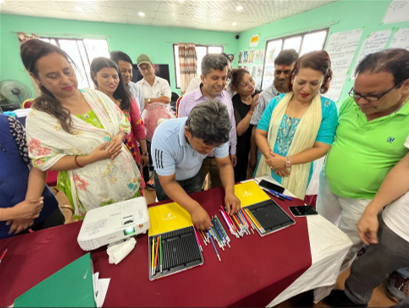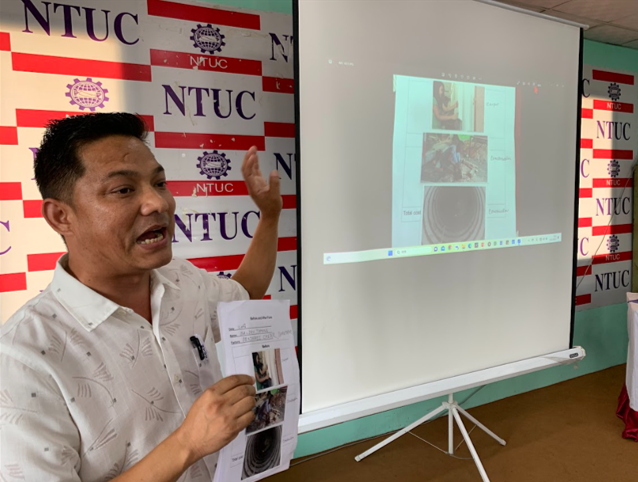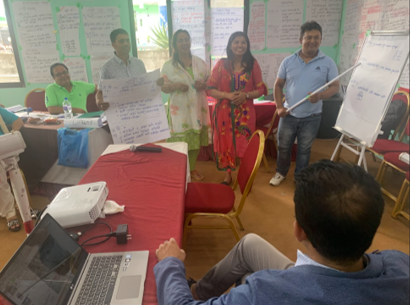Nepal POSITIVE Feasibility Workshop
On August 1 and August 2 in Kathmandu, Nepal, the Japan International Labour Foundation (JILAF) in collaboration with the Nepal Trade Union Congress (NTUC), held a POSITIVE Feasibility Workshop, which is a trade union-led immersive health and safety improvement program. This workshop was attended by 16 people, including past POSITIVE trainers.
With the addition of the “Principles of Occupational Safety and Health” to the ILO’s fundamental occupational standards, there was a two-day feasibility workshop to verify how well the assets of the POSITIVE occupational safety and health improvement program are currently being accrued and passed on in Nepal.
This was the fourth (and final) country to take part in the POSITIVE feasibility study, following Pakistan (online) and India last fiscal year and Bangladesh this fiscal year. The workshop in Nepal was carried out with a thorough system of support in place thanks to the JILAF Kathmandu Office’s meticulous preparation and response in addition to our longtime trusting relationship with NTUC.
All of the participants in this workshop were experienced trainers, and the performance of the participants in the workshop was as follows: (1) They focused on the positive aspects rather than the negative; (2) they integrated learning from the perspective of local best practices at a low cost; (3) their presentation skills in technical areas were sufficient; and (4) several of them shared past factory improvement cases with photos. For such reasons, it was confirmed that the assets of the program had been retained and passed on in Nepal.
At the opening of the workshop, Program Manager Kato congratulated the new executive committee and new chairman Yogendra Kumar, who were elected at the NTUC regular general meeting, and explained the purpose behind holding this POSITIVE Feasibility Workshop.
Chairman Yogendra highlighted the program’s features in light of his own experience as a trainer with, “The POSITIVE program not only contributes to improving the productivity of companies but also improves labor-management relations and is a necessary program for the livelihood of workers. Furthermore, it is also effective as an organizing tool, and the content is easily understood by employers.”
Next, Program Manager Kato outlined the “POSITIVE Program in Asia,” including (1) the status of the program’s deployment in 12 Asian countries, (2) strategies for developing trainers, and (3) an overview of the three countries where the feasibility workshop was held.
Then, he shared with the participants his experience as a trainer, including what was positive and what could be improved. The positive points were: (1) The once hostile labor-management relationship has improved since implementing the program; (2) workers have started wearing helmets and other personal protective equipment; (3) the emphasis on low cost prompted the employers to proactively cooperate; and (4) the generation gap in the workplace has disappeared. Meanwhile, the points for improvement were: (1) Evaluations and monitoring are necessary because the improvements proposed and incorporated did not last long; (2) the checklists need to be revised to suit the times; (3) methods need to be considered since the environment for training at the workplace is not fully in place; and (4) there have been numerous cases in which the understanding of employers could not be obtained, so implementation of the program by employers’ organizations is also being requested.
Following this, Occupational Safety and Health Expert Miwako Nagasu facilitated sessions on “Participatory Activities to Improve Workplace Environments,” “Simulated Checklist Practice,” “Transportation and Storage of Objects,” and “How to Propose Improvements to Management,” while Coordinator Matsui was in charge of the technical area of “Changing Workstations.” NTUC Vice President Palike and Mr. Shrestha, who have experience as trainers, were in charge of the technical area of “Workplace Environment,” demonstrating a highly-skilled performance as trainers.
In addition, for the first time, a group discussion was held on the topic of “effective approaches for improving labor-management relations and organizing.” Opinions included: (1) having employers attend when training is being conducted, (2) informing employers that there are also such benefits for them as improved productivity, and (3) negotiating with such thoroughly collected information as the status of factory production.
At the closing, Chairman Yogendra remarked, “Since COVID-19, safety and health initiatives have become increasingly important, but we are now in a situation where even labor laws are not being complied with in the workplace. When the POSITIVE Program was being implemented, the mindsets of union members became more positive, and the workplaces became more comfortable working environments. I sincerely hope that the POSITIVE Program will be revived.”
In response, Program Manager Kato presented all of the participants with certificates of completion and concluded the workshop with, “We will be exploring how to develop POSITIVE 2.0 within JILAF in such ways as collecting and analyzing questionnaires, but I was surprised to see that the program implemented over 10 years ago could still be conducted. Many of the new officers are also experienced trainers, so my hope is for them to start to engage with these activities voluntarily.”



